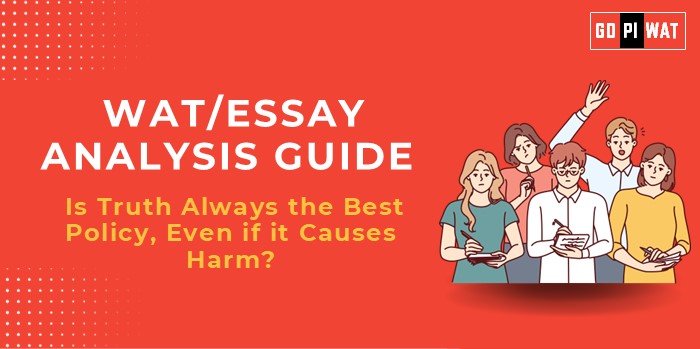📋 WAT/Essay Analysis Guide: Is Truth Always the Best Policy, Even if it Causes Harm?
🌐 Understanding the Importance of the Topic
Exploring whether truth is always the best policy aligns with B-school themes of ethical leadership and decision-making. It challenges candidates to balance philosophical ideals with pragmatic outcomes, making it a vital topic for reflective analysis.
📝 Effective Planning and Writing
- ⏱️ Time Allocation: 5 minutes for planning, 20 minutes for writing, and 5 minutes for reviewing.
- 📚 Preparation Tips: Identify real-world examples like whistleblowing or corporate transparency cases to anchor arguments.
💡 Introduction Techniques for Essays
- ⚖️ Contrast Approach: “While truth is universally valued, its potential to cause harm challenges its role as an absolute moral principle.”
- 🔍 Solution-Based Approach: “A world that embraces truth must also navigate the ethical minefields it creates.”
📂 Structuring the Essay Body
- ✨ Achievements:
- Transparency strengthens trust and governance (e.g., RTI Act’s success in India).
- ⚠️ Challenges with Comparative Analysis:
- Emotional distress from harmful truths, citing APA findings.
- Cultural differences in truth-telling norms (e.g., Eastern vs. Western ethics).
- 🌅 Future Outlook:
- Advocacy for balanced truth-telling frameworks integrating empathy and harm mitigation.
📄 Concluding Effectively
- ⚖️ Balanced Perspective: “Truth, while essential, must be wielded responsibly to ensure its benefits outweigh its costs.”
- 🌍 Global Comparison: “As seen in diverse cultural and policy contexts, truth must harmonize with the societal fabric to maximize positive impact.”
✍️ Sample Short Essays
Balanced Perspective:
Truth fosters long-term trust but requires a sensitive approach to mitigate potential harm. Philosophical ideals must align with practical realities for ethical outcomes.
Solution-Oriented:
Balancing transparency with empathy offers a pathway to uphold truth while minimizing harm. Leadership demands thoughtful execution of this principle.
Global Comparison:
The American emphasis on whistleblower protection and Scandinavian transparency norms illustrate how cultural context shapes truth’s impact.


